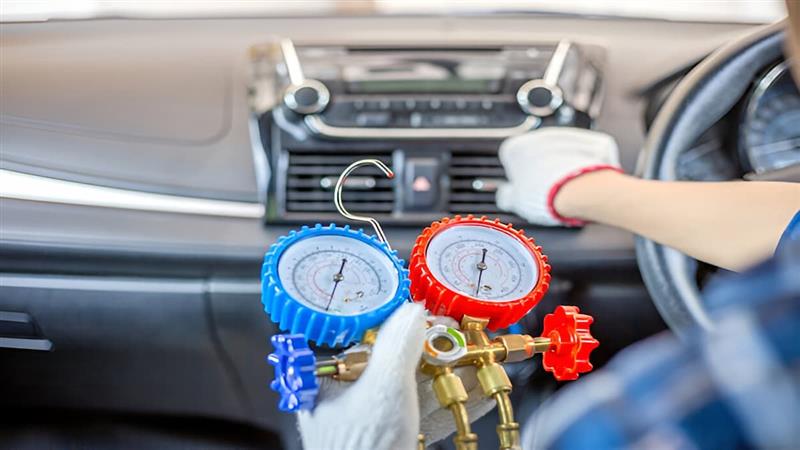How To Improve The Efficiency Of Your Vehicle’s Ac System?
- 74 Views
- arslanchaudhary7439@gmail.com
- April 8, 2025
- Blog
Comfort depends much on a vehicle’s Ac system, particularly in hot summer. Many car owners are unaware that inadequate AC maintenance can cause inefficient cooling, increased wear and tear, and more fuel consumption. Ways to enhance your car’s AC system are covered in this article; they guarantee optimal operation and lower energy use, therefore enabling more affordable and smoother driving.
Regularly Maintain and Clean the AC System
The efficiency of your car depends on how well you keep its air conditioning system. Like other vehicle components, the vehicle’s Ac system has to be maintained to function correctly. Dirty filters, clogged condensers, and refrigerant leaks cause the AC system to run more and cool less. Regular replacement or cleaning of the cabin air filter is recommended. Over time, dirt, dust, and debris can clog the air filter and impede flow. A blocked filter makes the AC work more, therefore reducing efficiency. Changing the filter yearly or every 12,000–15,000 miles can help performance.
Cleaning the condenser is another crucial maintenance chore. The front condenser of your car expels refrigerant heat. Debris and dirt lower system efficiency. Regular condenser cleaning and car air conditioning recharging guarantee refrigerant cooling and heat expulsion.
Check the Refrigerant Level and Recharge as Necessary
Low refrigerant levels cause many air conditioning systems to fail. Refrigerant, or Freon, removes cabin heat and releases it outside. Over time, refrigerants can leak and lose efficacy. Low refrigerant levels in a vehicle can make cabin cooling challenging and call for more system power. Examining and topping off refrigerant levels is absolutely necessary. Depending on use and environment, most cars should have refrigerant topped off every two to three years. Have a professional check for refrigerant leaks, such as warm air blowing from the vents or strange noises, before recharging.
Inspect and Replace the AC Compressor if Needed
Your car’s air conditioning system depends on the AC compressor. It sends the refrigerant to the condenser for compression, therefore releasing heat. A broken compressor will lower car AC cooling and system efficiency. An AC compressor needs attention if it makes odd noises, has reduced airflow, or has uneven cooling performance. If your vehicle’s Ac system fails, inspect and change the compressor. The performance of the whole AC system depends on the state of the compressor.
Ensure Proper Sealing of the System
Seals and leaks can harm your vehicle’s Ac system as well. Worn, cracked, or damaged system seals allow refrigerant to escape, lowering cooling. The compressor runs more, drawing more power and lowering system efficiency. Often, fittings, hoses, and compressor shafts break seals. Regularly inspecting these parts and changing worn seals will help to maximise AC performance. Seals are less expensive than other AC components, hence replacing them correctly will help you save money on expensive repairs.
Optimize Cabin Ventilation
The efficiency of the AC system is significantly influenced by car cabin airflow. Blocked vents or a broken blower motor can lower airflow, causing the system to work more to cool the cabin. To increase airflow, clean every vent of dirt and debris. Ensure the cabin air filter is clean and correctly placed to enable cabin-wide airflow.
Vent location also influences cooling. Aiming vents at the ceiling or floor helps to distribute air and cool. Unless absolutely required, stay away from the maximum fan speed as it consumes more energy. Without stressing the system, a moderate fan speed can cool it.
Avoid Overloading the Vehicle
Your car’s weight determines how much the AC runs. Running the air conditioning will require more energy for a car with passengers or cargo. The engine runs more to drive the vehicle, therefore wasting petrol and lowering AC performance. To increase AC performance and fuel economy, avoid carrying unneeded items. Close the windows to increase AC efficiency as open ones generate drag, therefore increasing engine power.
Park in the Shade to Reduce the AC’s Workload
To prevent overheating, park in the shade during heat wave. Direct sunlight increases cabin temperatures, therefore making the air conditioning work more. Parking under shade lowers cabin temperature and AC cooling time, therefore enhancing efficiency. But window tinting or a sunshade can help the vehicle’s Ac system keep a comfortable temperature by reducing heat buildup inside the vehicle.
Use a Professional AC System Inspection
Keeping the vehicle’s Ac system might not expose every problem. A competent technician can check the AC system for efficiency problems. The technician will check system performance, the condenser, the compressor, and refrigerant levels. This preventative measure guarantees the system runs well and finds problems before they turn to expensive repairs.
Conclusion
Upgrading your vehicle’s Ac system allows you to remain cool in hot weather, lowers engine load, and increases gas mileage. Keeping your AC running for years requires regular maintenance and cleaning, proper sealing, refrigerant level monitoring, and smart driving. Correct AC maintenance increases driving comfort and prolongs the life of the air conditioning components in your car. Actively increasing the efficiency of your air conditioning system helps to save energy, time, and money, so enhancing driving experience and car performance.
Visit Study Cafe for more informative blogs.
